CARMEN SOUZA / “Carmen Souza Mixtape”
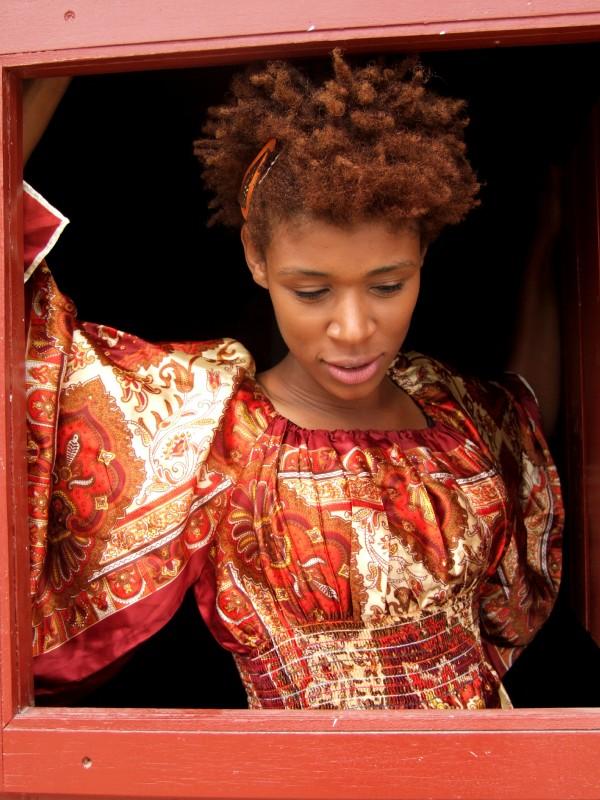
In the search of my real and true identity I go through all that surrounds me and all that influences me, and the main thought that crosses my mind is: “No matter what I find, I have to be true to myself, to what I believe, to what I like and the person that I want to become, simple and true. I have so much influence that I consider myself a being from the world, that won’t fit in any stereotype or culture, because I was born in between cultures...and honestly I have no intention of becoming a purist in any way , in any style, that wouldn’t be true to myself and I would be forcing something unnatural. I believe that the world is so mixed everywhere in any corner that either you close yourself to all that is happening around you, or you just let all the influences lead you and flow within you, be creative and invent a new sound that says the most things about yourself...without losing your roots.I guess what I mean is that I don’t want to be one more...I want to be Me, with a testimony to share that can reach, touch or even change lives...I believe that is my mission!This is a challenge to write about Carmen Souza. There is so much I want to say and yet I know very little about her and have an even smaller cognitive understanding of the Creole language in which she sings and near total ignorance in terms of the details of her personal and social history. My limitations notwithstanding, I think Carmen Souza is doing very important work. Her efforts and accomplishments offer us not only great promise, but also great encouragement in our struggles to create a better and more beautiful life.
—Carmen Souza
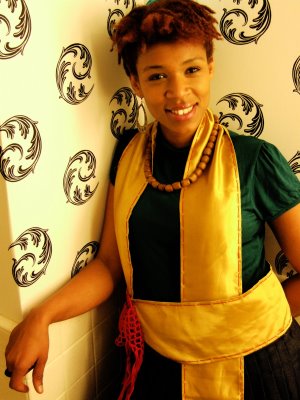
Carmen Souza was born May 20, 1981 in Lisbon, Portugal of Cape Verdean parents. There was music in the home but her parents were not professional musicians. Like many of us, Carmen started her musical career singing in a church choir.
In 1999 she was selected to join Shout, a Portuguese Gospel Choir. (Trivia note: Sara Tavares also sang and recorded with Shout.) During Carmen’s tenure with Shout she deeply impressed Theo Pas’cal, the producer and musical director of Shout. Eventually, Pas’cal became her producer and musical director and for the last eight years also her bassist.
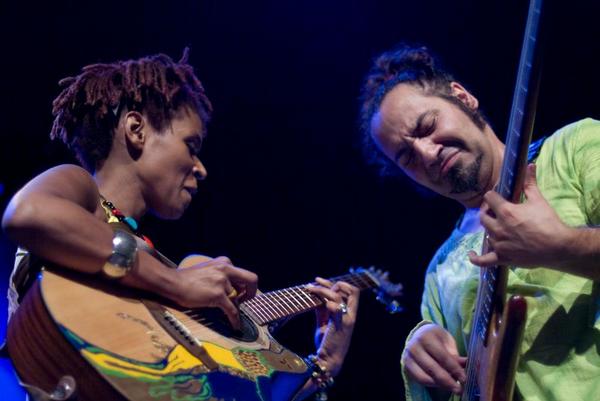
Although she is deeply influenced by a wide variety of music and in fact considers herself a jazz musician, Carmen Souza also made a major commitment to Cape Verdean culture. She sings in Creole, studies and utilizes Cape Verdean traditional musical rhythms, melodies and forms. Plus, she writes her own lyrics, statements and observations about life that are philosophically challenging rather than limited to paeans about the search for love and happiness or the bitterness of dealing with the aftermaths of failures to actualize love and happiness.
On the one hand Carmen Souza is not a native of Cape Verde but in her heart and in her imagination she is culturally umbilicaled to the archipelago of islands resting just off the West Coast of Africa.
Unlike Gertude Stein’s observation about some places in the USA (there is no “there” there), Cape Verde is a definite center of social, cultural and spiritual gravity retaining its hold on its citizens regardless of how far flung their orbit may be.
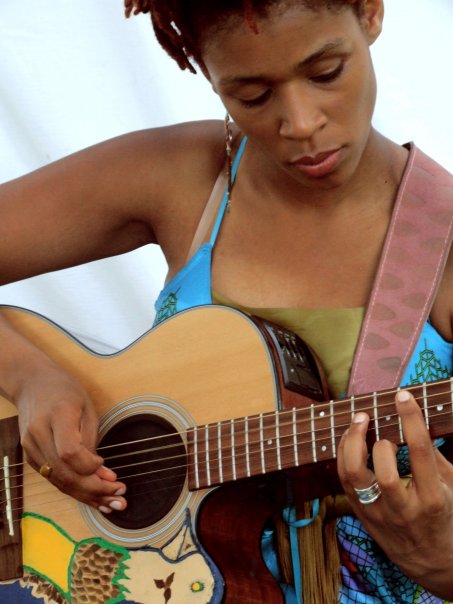
Carmen’s music is not good background music. There always seems to be something serious going on. The complexity of some of the constructions require the listener to pay close attention even as the rhythms invite dance.
Carmen has produced three albums and each is not only distinctive, taken together they map out an interesting approach to the question of authenticity. How does one know when one is keeping it real?
So many people say they are trying to combine the old and the new, that they are trying to move forward while not forgetting about their roots, but the end results are more often than not flashes in the air that are forgotten less than 24 hours later.
I am so tired of glib propositions, people earnestly saying “check me out, my music is a mix of different influences including jazz.” Those who claim jazz usually confuse three or four minutes of improvisation on a track or two, or even three with being a serious jazz musician.

Carmen Souza has paid her dues, honed her craft and developed not only a vision but actually put together a body of music that is a true hybrid. I encourage you to listen to this Mixtape straight through at least once. Actually, a second listen would help tremendously because there are not many references for what is happening here. I won’t say that nobody else is doing this but I will say Carmen Souza is dancing her own dance. The key is that her choreography, the way she puts her music together, is original. Moreover, this is not mainly music made in the studio. With Carmen this is music she creates in performance with a small ensemble of musicians.
I’ve chosen four tracks from each of her three albums—actually the debut album has a twin. Ess ê nha Cape Verde/This is my Cape Verde (2005) was completely remixed and a track was added. Unfortunately, I have not been able to get my hands on the remix project yet.
The ironically named first album sounds like where most people would end up after experimenting with combining traditional elements with contemporary forms and instrumentation even though the lyrics focus on traditional Cape Verdean myths, stories and realities.
Verdade/Truth (2008), Carmen’s second album, strikes me as the closest to what I expected her music to sound like. I found it the easiet entrance into the musical world of Carmen Souza.
Protegid (2010), the new album, is definitely a jazz album, and also definitely a Cape Verdean album. I particularly enjoy how the solos are integrated into the song structures. Unfortunately, the album is not yet available on the USA.
I started to say a lot more but this write-up is beginning to sound too complicated. Carmen’s music reminds me of music back in the seventies, simultaneously solid and experimental, both inspiration and entertaining, elegantly serious and dancingly enjoyable.
I’ll give the last words to Carmen talking about the craft of songwriting.
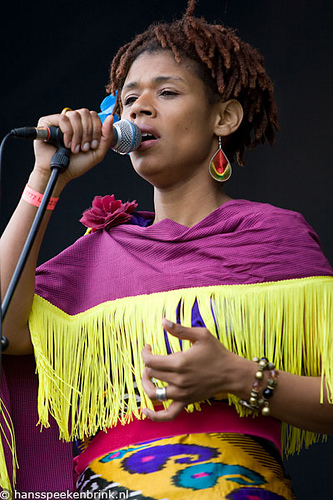
The process of writing lyrics is always retrospective and introspective. Normally I Just hear what the song has to tell me when it is still in construction and together with the melody I just write it. Not always the song speaks so quickly to me, or the right words just vanish from my head, so it can be a bit frustrating sometimes…it’s not always the same process. It’s also about emotional feelings that I am dealing with when I write so this can be a very hard job in terms of energy, emotion….I know that I have a mission as not only a musician that simply sings songs, but I feel that I have a mission as a messenger, so my preoccupation is that I don’t speak about what everybody else does (superficial things), but I speak about profound and strong, I can say that I go the extra mile with the subjects. And these subjects that evolve on my mind or throughout conversations, they are so strong and gain force when they complemented with the song. So if you read the lyrics you will see that what I’m saying is what is real about me , experiences, daily life in which I try to really understand the purpose of everything and specially my own purpose in the world.
—Carmen Souza
I strongly recommend Carmen Souza. She is an example of the new world (hopefully) a coming on strong.
—Kalamu ya Salaam
Carmen Souza Mixtape Playlist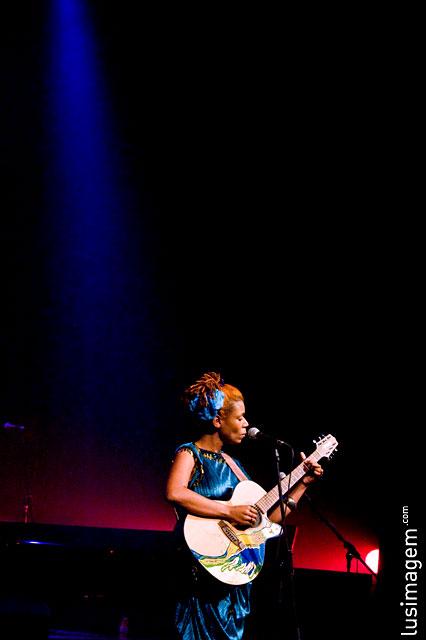
Unfortunately, although she has three albums, only the debut album is available in the USA—and only as an expensive import. Hopefully within the next couple of months the distribution issues will be addressed. I’m certain if nothing else, at least mp3 downloads will be made available. Meanwhile, enjoy this Mixtape.
Trivia note: Carmen does her version of Horace Silver's iconic "Song For My Father" on her last latest album. It's the last song on the Mixtape. What's interesting is that she not only wrote her own lyrics to reflect her father/daughter relationship with her father who was a seaman and away more than present, but she also scats Horace's original solo, a technique known as vocalese—i.e. vocalizing famous jazz solos.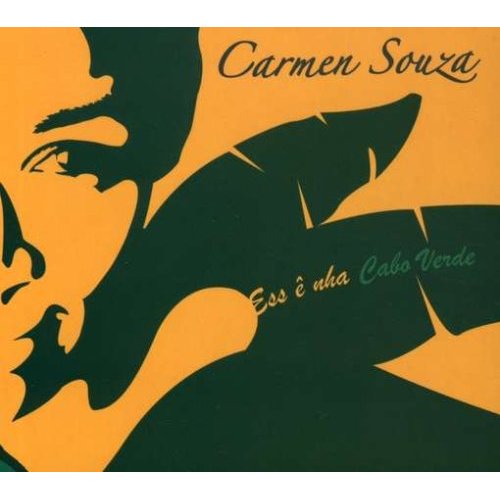
Ess e nha Cabo Verde
01 “Nha Deus”
02 “S'm pudesse fala”
03 “Por tud qui bo”
04 “Vide e pa celebra”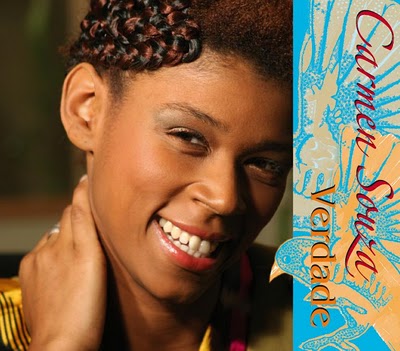
Verdade
05 “Confianca”
06 “Levanta No Bai”
07 “Pergunta Sem Fin”
08 “S. Anton M'Cre Conche bo Estoria”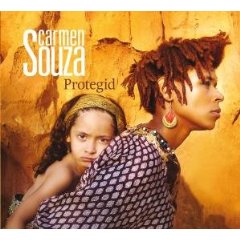
Protegid
09 “Afri ka”
10 “Magia ca tem”
11 “Sodade”
12 “Song for my father”
This entry was posted on Monday, March 1st, 2010 at 5:23 am and is filed under Contemporary. You can follow any responses to this entry through the RSS 2.0 feed. You can leave a response, or trackback from your own site.
One Response to “CARMEN SOUZA / “Carmen Souza Mixtape””
January 17th, 2016 at 5:41 pm
There is definately a lot tto find out about this issue. I really like alll of the points you made.
Leave a Reply
| top |